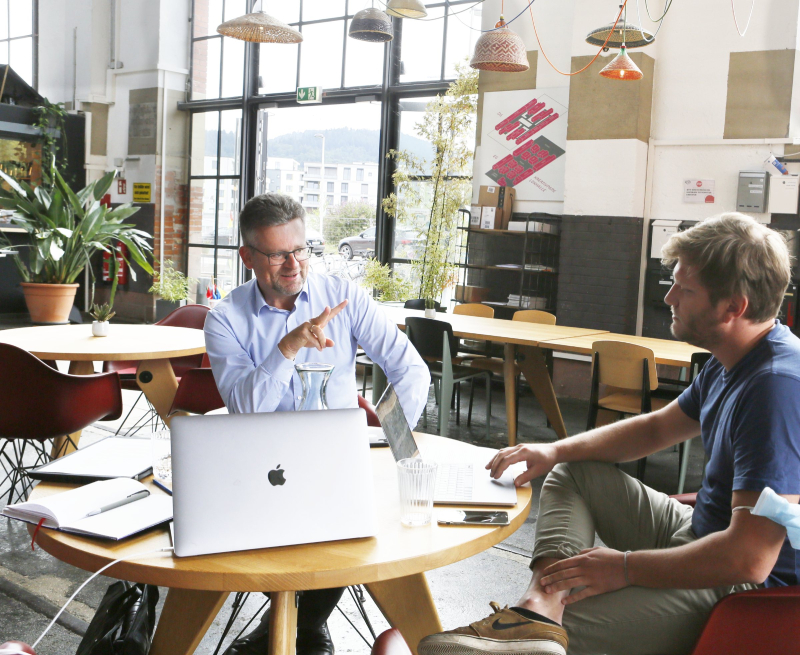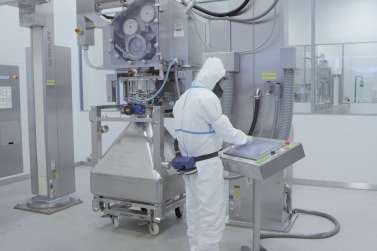Sustainable solutions with impact: Five exemplary collaborations between startups and Pfizer as part of the GROW program
7 min

How can industrial production processes become more emission-, energy- and resource-efficient? With the GROW program, the Pfizer Healthcare Hub and the Smart Green Accelerator want to launch collaborations between startups and Pfizer to make industrial production processes more efficient, digital and sustainable. With Peter Neske, Innovation Lead at Pfizer Healthcare Hub Freiburg and Phillipp Rottmann, Program Manager at Smart Green Accelerator, we took a look at what such collaborations can look like.
Through our collaboration with innovators such as startups, spin-offs or tech companies, we not only want to develop sustainable production solutions for the Freiburg site, but also scale out of Baden-Württemberg and generate real impact: What works at the Freiburg plant works at 43 other Pfizer sites around the world – and at the same time serves as a role model for other industries.
Do you want to GROW? How startups benefit from the GROW program
The GROW program is aimed at startups with a market-ready product that want to develop collaborations at eye level with corporate partners like Pfizer – always with the mission of advancing the energy transition in mind. To this end, our Pfizer departments identify challenges to which we look for innovative solutions in six months with the steps Scouting, Matching and Collaboration. The program ends with the so-called "Demo Day", where it is presented whether a pilot, a proof of concept or a user acceptance test will be launched. The Smart Green Accelerator brings the stakeholders to the table and guides the development and implementation of the collaborations.
"The difficulty for any startup is the first big customer. Startups don't have mature processes, products or structures yet. But companies are not used to getting unfinished solutions. GROW provides the necessary framework to bring the two players together. Pfizer's expertise and experience on the one hand and new, innovative approaches on the other," says Philipp Rottmann of the Smart Green Accelerator.
Factory simulation with operaize and plus10
Christine Steinhart: Let's start with a look at the current GROW round: is there potential for a collaboration between Pfizer and a startup?
Phillipp Rottmann: The challenge this year, the optimization of the FAST(Fully Automated System Transport) process, was very specific. Finding a startup with a solution approach that fits the challenge very specifically was challenging. With plus10 from Stuttgart and operaize from Cologne, we found two promising companies that approach the challenge in very different ways: one approaches it technologically, the other focuses on the system architecture.
Christine Steinhart: And what is the current status?
Peter Neske: In a first step, we worked out the various solution ideas with the support of the specialist departments. We are now in the middle of the "Exploration Sprint", in which we are concretizing our cooperation goals. In the next step, we will decide whether a cooperation will take place. Regardless of whether the two sides decide to collaborate, we observe that the startups benefit enormously from this process: Having someone from a company who thinks for an organization and drives solutions is very valuable for the product development.
Resource efficiency with wattron
Christine Steinhart: Let's look at a cooperation attempt that was initially promising but then ended. What potential did the cooperation with wattron offer?
Peter Neske: wattron had a clever solution for optimizing the use of blister foil by using less packaging material. The Freiburg site has won several environmental awards from the state of Baden-Württemberg – so resource efficiency and optimization is a mandatory topic.
Christine Steinhart: Why did the cooperation still not come about?
Phillipp Rottmann: We realized at the time that Pfizer as a user was not the best contact at all, but that the solution had to be positioned with the device manufacturer, a learning for the next GROW rounds. We networked the players and then pulled back.
Developing an IoT platform for safe drug production with mondas
Christine Steinhart: Let's look at the collaboration with mondas, a Fraunhofer spin-off – what was the challenge that led to this cooperation?
Philipp Rottman: The starting point for the cooperation with Mondas was the search for a solution for monitoring and fail-safe control of production machines.
Christine Steinhart: What is special about this cooperation and what kind of lessons did you learn?
Peter Neske: When you ask the question, "How does an IT solution fit into a global IT structure?", it becomes complex – Mondas is a prime example of this: It took a year to get to the proof of concept, the project then went to the specialist departments, and from there it continues. As part of the GROW program, we were able to successively fine-tune the tasks to real-world conditions and, with Siemens, also bring another partner on board who was important for the project. Together, we were able to develop a valuable solution that now has the chance to become a global benchmark in the Pfizer organization.
Energy efficiency with perto
Christine Steinhart: But there were also collaborations that led to rapid and measurable success, such as the cooperation with perto. What was the challenge and how did the project get started?
Peter Neske: The cooperation with perto started with a pilot project: A profitability and efficiency analysis was carried out on 16 pumps at the Freiburg plant. Within 14 days, the perto team was already able to deliver optimization proposals that lead to a reduction of 23 tons of CO2 per year. This solution can now be scaled across Freiburg and thus represents a significant mosaic stone in the annual energy savings targets at the site. International scaling from Freiburg is also conceivable here.
Phillipp Rottmann: The cooperation with perto was not the result of a specific challenge. Startups apply for the GROW program on a permanent basis. In this respect, perto is a good example of the pull created by the collaboration between the Pfizer Healthcare Hub and the Smart Green Accelerator, which attracts startups from all parts of Germany and even beyond.
Christine Steinhart: What is special about this triple constellation of Smart Green Accelerator, Pfizer Healthcare Hub and startup?
Phillipp Rottmann: On the one hand, with our collaboration we are promoting an innovation ecosystem that supports the startup spirit and provides fertile ground for innovative ideas.
On the other hand, we have created a system with an important enabler function: Together, we can support startups in their first major contract and, in the process, bring sustainable technologies with enormous scaling potential onto the road: From the production site in Freiburg into the global Pfizer organization – and beyond that into other industries.
Click here to register for the Matching Process 2022 or contact us if you want to collaborate with Pfizer!

